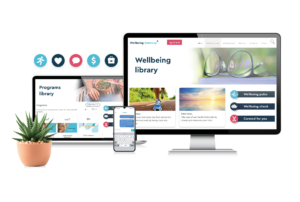It encourages us to look at the person as a whole and consider how each pillar of wellbeing contributes to our overall health and wellbeing, not just someone’s illness or mental health condition.
What is holistic health?
Holistic health views the body as a whole system, where all aspects of a person contribute to their overall health.
For example, while exercising is good for your physical wellbeing, it would be counter-intuitive to neglect nourishing your body with healthy foods or allowing yourself to get enough rest.
However, if you were to consider the impact of exercise, nourishment and rest together and place equal importance on all three, your overall health is likely to improve.
Each aspect of our health contributes to our overall wellbeing.
Why is holistic health important for mental wellbeing?
Holistic health isn’t about finding quick fixes to resolve isolated issues. Rather, it combines all aspects of wellbeing to achieve a balanced and complete approach to health.
It is widely recognised that all aspects of our health and wellbeing contribute to our mental wellbeing, but this can look different for everyone.
Often, mental heath issues don’t happen in isolation and are interconnected with other aspects of our overall health.
Holistic health doesn’t just focus on areas of concern, but considers how other aspects of wellbeing may improve mental health outcomes.
When we find the right balance between physical, emotional, social, financial and mental wellbeing, we create a robust foundation for overall health.
How can I help myself?
Holistic health takes into consideration all the interconnected aspects of our health but there are some simple things you can do that will have a positive impact on your overall health and wellbeing.
1. Nourish your body
Eat a colourful and balanced diet rich in whole foods, fruits, vegetables, and lean proteins.
Stay hydrated and limit your intake of processed foods, excess sugar and other stimulants where possible.
2. Get moving
Physical activity helps release endorphins (the happy hormone) and is a natural mood booster.
Find time each day to get your heart rate up and move your body – go to the gym, run, swim, attend a dance class, go for a walk, do some yoga or Pilates… anything that brings you joy and makes you feel good.
3. Prioritise your emotional wellbeing
Practice stress management techniques like meditation, deep breathing, or journaling.
Make time each day for self-care and look after yourself.
4. Stay connected
Humans thrive on social connections.
Make time to connect with your loved ones and those around you often – have lunch with a colleague, go for a walk with a friend, call a loved one on your way to or from work, or join a local club with people who share the same interests as you.
5. Count your pennies
Financial stress can impact mental health and many people are struggling in the current financial climate.
Create a budget so you know where your money is going, and identify any savings opportunities.
If needed, seek professional help to get on top and feel in control of your finances.
6. Find your purpose
We spend a lot of time at work, so find a job that aligns with your personal values and gives you a sense of purpose and pride.
Holistic health is about recognising each unique individual as a whole person and finding the right balance for their health and wellbeing.
You can make some small changes in different aspect of your life and reap the rewards by taking a holistic view of your wellbeing.
Something on your mind?
If you require counselling, coaching or support, our clinicians are available to help.
Call, chat or request an appointment online.
Looking for more resources?
Register for Wellbeing Gateway. Your personalised mental health and wellbeing companion.

